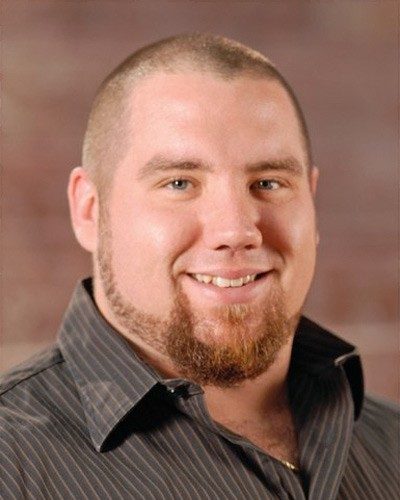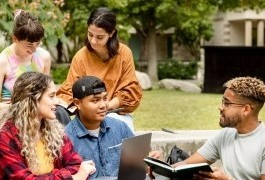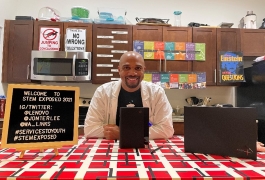Ph.D.-Bound Chemist Finds Professional Home in Chemical Safety
- Chemical Safety Program Manager, Princeton University
- B.S., Chemistry, Texas Lutheran University, Seguin
- M.S., Organic and Polymer Chemistry, Texas A&M University, College Station
Brandon Chance helps ensure a culture of safety in Princeton University’s laboratories. He conducts training on the safe use of chemicals, equipment, and facilities. He monitors hazards and risks. In the event of a chemical spill or laboratory incident, he is one of the primary emergency responders, though a big part of his job is helping researchers avoid incidents in the first place. When researchers set up new equipment, novel experiments, or new procedures, Chance conducts hazard and risk assessments to minimize the potential for damage and injury.
What’s a typical day on the job like?

A typical day starts between 8 and 9 a.m., when I start off by catching up with emails and arranging my calendar for the day. If a training session is scheduled, I prepare for that session and review appropriate materials. I could have a variety of meetings scheduled with anyone from undergraduate researchers to the Office of the Dean for Research. At least two days a week, I am out on campus visiting laboratories and catching up with the researchers on current projects, performing audits, or offering my help and expertise wherever it is needed. If there is an incident on campus involving a laboratory, then I am called out immediately to assess and investigate the situation.
My favorite part of the job is the on-campus consulting and outreach I am able to do across a broad spectrum of fields. Researchers contact me with questions regarding procedures and methods and how to safely accomplish various research goals. I work very closely with undergraduates on a variety of student projects. I am also the lead investigator on lab-related accidents that occur on campus.
How did you get your start in your career?
When I graduated with my B.S. degree in chemistry, I had already been accepted to graduate school, but wanted to gain a little work experience first. I worked for one year as a temporary employee for AkzoNobel. After that year, I enrolled in a Ph.D. program at Texas A&M University (TAMU), with a focus on organic and polymer chemistry.
In my third year of graduate school, the Science Program Chair from TAMU’s new branch campus in Qatar was visiting on a summer sabbatical and actively recruiting experienced people to set up research and academic labs, as well as teach the laboratory courses. It was over a coffee at the campus library that I made the decision to take a leap of faith, leave graduate school, and move halfway around the world. It was one of the best decisions that I have ever made!
When I made my decision, I had already done enough work in my graduate studies to finish with a master’s degree, so I wrapped up my research and wrote my thesis while I was making preparations to move.
What do you like most about your job?
I love the part of my job that gets me out into the laboratories and into the field with the researchers. While part of my job is as a traditional compliance officer, it is the lab and field work that keep me excited.
Coming from an international research background, I can really connect with the students’ and faculty members’ research projects and keep abreast of the awesome work that is going on at Princeton. My experience in Qatar showed me how other countries approach research and safety issues, and I have a better understanding of what foreign students experience when they come to the United States to study. I was born and raised in the Houston, Texas, area, and Qatar is a desert nation — so coming to Princeton was a real change for me as well.
What’s the best career advice you’ve received?
Never shy away from a challenge, and always look toward the future. Do not lock yourself into one specific field or a specific job. Be flexible and willing to go outside of your comfort zone. I would advise new graduates to get in as much training and travel as they can early in their careers, in order to learn things about their jobs that they didn’t pick up in school. Don’t think that you have to go straight into graduate school. Think outside the box — lots of options are available.
What has contributed to your success?
My graduate school experience and research background have been a big help. I approach safety issues more as a collaborator than as an enforcer of rules. I do some background research on faculty members and their projects so that I can approach them as a collaborator. I help them design and conduct their research safely, rather than coming in and imposing limitations on them.



